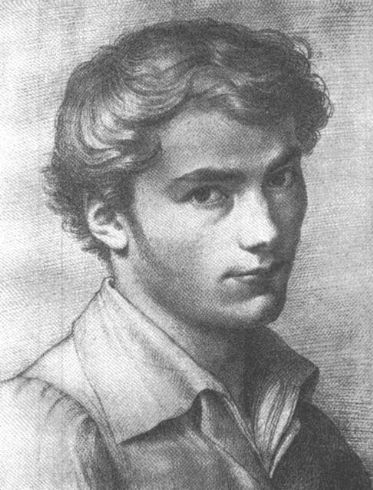|
Gay Wisdom for Daily Living brought to you by White Crane Institute ͏ ͏ ͏ ͏ ͏ ͏ ͏ ͏ ͏ ͏ ͏ ͏ ͏ ͏ ͏ ͏ ͏ ͏ ͏ ͏ ͏ ͏ ͏ ͏ ͏ ͏ ͏ ͏ ͏ ͏ ͏ ͏ ͏ ͏ ͏ ͏ ͏ ͏ ͏ ͏ ͏ ͏ ͏ ͏ ͏ ͏ ͏ ͏ ͏ ͏ ͏ ͏ ͏ ͏ ͏ ͏ ͏ ͏ ͏ ͏ ͏ ͏ ͏ ͏ ͏ ͏ ͏ ͏ ͏ ͏ ͏ ͏ ͏ ͏ ͏ ͏ ͏ ͏ ͏ ͏ ͏ ͏ ͏ ͏ ͏ ͏ ͏ ͏ ͏ ͏ ͏ ͏ ͏ ͏ ͏ ͏ ͏ ͏ ͏ ͏ ͏ ͏ ͏ ͏ ͏ ͏ ͏ ͏ ͏ ͏ ͏ ͏ ͏ ͏ ͏ ͏ ͏ ͏ ͏ ͏ ͏ ͏ ͏ ͏ ͏ ͏ ͏ ͏ ͏ ͏ ͏ ͏ ͏
|
|
||||
| This Day in Gay History | ||||
January 31Born 1797 - Austrian composer FRANZ SCHUBERT was born. He wrote some six hundred Lieder, nine symphonies (including the famous "Unfinished Symphony"), liturgical music, operas and a large body of chamber and solo piano music. He is particularly noted for original melodic and harmonic writing. While Schubert had a close circle of friends and associates who admired his work (including his teacher Antonio Salieri and the prominent singer Johann Michael Vogl), wider appreciation of his music during his lifetime was limited at best. He was never able to secure adequate permanent employment, and for most of his career he relied on the support of friends and family. Interest in Schubert's work increased dramatically in the decades following his death. Schubert was significantly influenced by his close-knit group of male friends, known as the Schubert Circle. His relationships with an older school friend Joseph von Spaun, the young poet Johann Mayrhofer, and the wealthy young sensualist Franz von Schober were the most important of his life. He and Schober often lived together for extended periods. Citing the composer's dissipation, his lack of female love interests, his passionate male friendships and several oblique references in his surviving correspondence, Maynard Solomon has argued that Schubert's primary erotic orientation was homosexual. The immediate reaction on the part of many musicologists and music critics, who often simply refused to consider the evidence, revealed a deep-seated homophobia among many specialists in classical music. But in recent years the notion of a Gay Schubert has become if not commonplace, at least much less controversial. Schubert's alleged homosexuality and its effect on his music are subjects of continuing debate among music historians and critics. Upon his early passing, and by his own request Schubert was buried next to Beethoven, whom he had admired all his life, in the village cemetery of Wahring. 1902 - American legend of stage and screen TALLULAH BANKHEAD was born in Huntsville, Alabama and show business has never been the same. Let's just start with if Tallulah Bankhead hadn't existed someone would have had to invent her. Bankhead came from a powerful Democratic political family in the South in general and Alabama in particular. Her father was the Speaker of the United States House of Representatives from 1936-1940 and she was the niece of Senator John H. Bankhead II and granddaughter of Senator John H. Bankhead. Bankhead herself was a Democrat, albeit one of a far more liberal stripe than the rest of her family. In 1923, she made her debut on the London stage, where she was to appear in over a dozen plays in the next eight years, most famously, The Dancers. Her fame as an actress was ensured in 1924 when she played in the 1925 Pulitzer Prize winning They Knew What They Wanted. She was famous not only as an actress but also for her many affairs, infectious personality and witticisms like "There is less to this than meets the eye" and "I'm as pure as the driven slush." She was brash, brazen and apt to say anything. And usually did. This trait made her widely popular. She was known for her enthusiastically promiscuous behavior and had the reputation of being sexually available to anyone she found attractive, famous or not. By the end of the decade, she was one of the West End's — and England's — best-known and most notorious celebrities. She may well have coined the definition of “promiscuous”: Anyone who has more sex than you. Promiscuity came naturally to Bankhead and she went to bed with anyone who was interested. She professed to having a ravenous appetite for sex, but not for a particular type. "I've tried several varieties of sex. The conventional position makes me claustrophobic. And the others give me either stiff neck or lockjaw," she said. Once, at a party, one of her friends brought along a young man who boldly told Bankhead that he wanted to make love to her that night. She didn't bat an eye and said, "And so you shall, you wonderful old-fashioned boy." She returned to the US in 1931 to be Paramount Pictures' "next Marlene Dietrich", but Hollywood success eluded her in her first four films of the 30s. Critics agree that her acting was flat, that she was unable to dominate the camera, and that she was generally outclassed by Dietrich, Carole Lombard, and others. Bankhead's first film was the George Cukor directed Tarnished Lady (1931). Cukor and Bankhead became fast friends. Bankhead herself was not very interested in making films. The opportunity to make $50,000 per film, however, was too good to pass up. Following the release of the Kinsey Reports, she was once quoted as stating; "I found no surprises in the Kinsey Report. The good doctor's clinical notes were old hat to me…I've had many momentary love affairs. A lot of these impromptu romances have been climaxed in a fashion not generally condoned. I go into them impulsively. I scorn any notion of their permanence. I forget the fever associated with them when a new interest presents itself." Thus, comments such as that quoted above and many other actions in her life led to her reputation, of which she never made excuses. She was outspoken and uninhibited but she successfully avoided scandal related to her affairs, regardless of the gender of her lovers. She was known to have stripped off her clothes on several occasions while attending parties, which shocked people in attendance, but nonetheless she remained magnetic to those who knew her well. Her personality, it was said, made her almost irresistible as a friend, or a lover. Rumors about her sex life have lingered for years, and she was linked romantically with many notable female personalities of the day, including Garbo, Dietrich, Eva Le Gallienne, Laurette Taylor, Hattie McDaniel, and Alla Nazimova, as well as writer Mercedes de Acosta and singer Billie Holiday. She was reportedly extremely excited when she was first able to meet the elusive Garbo, but whether they were sexually involved has never been determined beyond a doubt. The two women played tennis together often, and were said to have enjoyed one another's company, but Garbo was extremely protective of her private life and secretive about her lovers. Bankhead was married to actor John Emery from 1937 to 1941. In 1932, she expressed some interest in spirituality, but did not outwardly pursue it, except for a time when she met with the Indian mystic, Meher Baba.In 1933, Bankhead nearly died following a five-hour emergency hysterectomy for an advanced case of gonorrhea, which she claimed she contracted either from George Raft or Gary Cooper. Only 70 pounds when she left the hospital, she stoically said to her doctor, "Don't think this has taught me a lesson!" In 1934, after recuperating in Alabama, she returned to England. After only a short stay, she was called back to New York to play in Dark Victory. She continued to play in various performances over the next few years, mostly mediocre. Nevertheless, David O. Selznick called her the "first choice among established stars" to play Scarlett O'Hara. However, moviegoers answering a poll thought otherwise. Her screen test for Gone with the Wind put her out of the running for good. Selznick decided that she was too old (an ancient 34) for Scarlett's antebellum scenes. Unable to capture Hollywood, Bankhead returned to her most-loved acting medium, the stage. On Broadway, Bankhead's career stalled in unmemorable plays until she played the cold and ruthless Regina Giddens in Lillian Hellman's The Little Foxes (1939) a roll she was, perhaps, born to play. Her portrayal won her the New York Drama Critics' Circle Award for Best Performance, but Bankhead and Hellman feuded over the Soviet Union's invasion of Finland. Bankhead (a staunch anti-Communist) was said to want a portion of one performance's proceeds to go to Finnish relief, while Hellman (an equally staunch Stalinist) objected strenuously and the two women didn't speak for the next quarter of a century. More success and the same award followed her 1942 performance in Thornton Wilder's The Skin of Our Teeth, in which Bankhead played Sabina, the housekeeper and temptress, opposite Fredric March and Florence Eldridge (Mr. and Mrs. Antrobus, and also husband and wife offstage). During the run of the play, some media accused Bankhead of a running feud with the play's director, Elia Kazan, a story Kazan confirmed in his autobiography, averring as how that Bankhead was one of the few people in his life that he ever actually detested. Tallulah Bankhead's career slowed in the mid-1950s, but she never faded from the public eye. Although she had become a heavy drinker and consumer of sleeping pills (she was a life-long insomniac), Bankhead continued to perform in the 1950s and 1960s on Broadway, in the occasional film, as a highly-popular radio show host, and in the new medium of television. Her last motion picture was a British horror film Fanatic (1965) co-starring Stefanie Powers, which was released in the U.S. as Die! Die! My Darling!. Her last appearance on screen came in March 1967 as the villainous Black Widow in the Batman TV series. The stories about Bankhead are legendary and perhaps apocryphal: A sampling: In 1944, Alfred Hitchcock cast her as the cynical journalist, Constance Porter, in Lifeboat. The performance is widely acknowledged as her best on film, and won her the New York Film Critics Circle Award. Almost childlike in her immodesty, a beaming Tallulah accepted her trophy and exclaimed, "Dahlings, I was wonderful!" Bankhead circulated widely in the celebrity crowd of her day, and was a party favorite for outlandish stunts such as underwear-less cartwheels in a skirt or entering a soirée stark naked. According to author Brendan Gill, when Bankhead entered the hospital for an illness, an article was headed "Tallulah Hospitalized, Hospital Tallulahized." This headline was a testament to Bankhead's large, charismatic personality (which inspired much of the "personality" of the character Cruella De Vil in Disney's 101 Dalmatians). Bankhead was also a fan of the soap opera, The Edge of Night. It has been said that after watching a female character agonize over a man, Bankhead contacted the producers of the show and said, "Why doesn't she just shoot the bastard?" 1942 - English film director, stage designer, artist and writer DEREK JARMAN was born in Northwood, Middlesex. He is most remembered for his remarkable films like Jubilee, The Tempest, Caravaggio, The Garden and this writer’s personal favorite, Edward II. Jarman was one of the few openly gay public figures in Britain in the 1980s and remained a fierce activist for the rights of gay people for the rest of his life. He died in 1994 of complications from HIV/AIDS. His creative life wasn’t limited to film. Jarman's work broke new ground in creating and expanding the fledgling form of 'the pop video' in England, and in gay rights activism. Several volumes of his diaries have been published. Jarman also directed the 1989 tour by the UK duo Pet Shop Boys. By pop concert standards this was a highly theatrical event with costume and specially shot films accompanying the individual songs. Jarman was the stage director of Sylvano Bussotti’s opera L’Ispirazione, first staged in Florence in 1998. Jarman is also remembered for his famous shingle cottage-garden, created in the latter years of his life, in the shadow of Dungeness nuclear power station. The cottage is built in vernacular style in timber, with tar-based weatherproofing, like others nearby. Raised wooden text on the side of the cottage is the first stanza and the last five lines of the last stanza of John Donne’s poem, The Sun Rising. The cottage garden was made by arranging flotsam washed up nearby, interspersed with endemic salt-loving beach plants, both set against the bright shingle. The garden has been the subject of several books. At this time, Jarman also began painting again (see the book: Evil Queen: The Last Paintings, 1994). Jarman was the author of several books including his autobiography Dancing Ledge, which details his life until the age 40. He provides his own insight on the history of gay life in London (60's-80's), discusses his own acceptance of his homosexuality at age sixteen and accounts of the financial and emotional hardships of a life devoted to film-making. A collection of poetry A Finger in the Fishes Mouth, two volumes of diaries Modern Nature and Smiling In Slow Motion and two treatises on his work in film and art The Last of England (also published as Kicking the Pricks) and Chroma. Other notable published works include film scripts (Up in the Air, Blue, War Requiem, Caravaggio, Queer Edward II and Wittgenstein: The Terry Eagleton Script/The Derek Jarman Film), a study of his garden at Dungeness Derek Jarman's Garden, and At Your Own Risk, a defiant celebration of Gay sexuality. 1945 - Activist, anthropologist and author TOBY MAROTTA born. Marotta is the author of The Politics of Homosexuality (ISBN-10: 0395294770 Boston: Houghton Mifflin, 1981) and Sons of Harvard (ISBN-10: 0688019072 New York: William Morrow 1982). He has devoted the past two decades to HIV/AIDS-related anthropology and web-based health education. His Community-Roots Archives preserves documents and memorabilia collected during a 35-year career of community-based research. For more: http://www.rootsarchive.com 1948 - American singer, actor, songwriter and producer PAUL JABARA was born on this date (d. 1992) Born in Brooklyn, New York as Paul Frederick Jabara, he won an Oscar for the song "Last Dance", as performed by Donna Summer in the film "Thank God It's Friday". He was co-founder of the Red Ribbon Project in 1991. His theater career included: Hair (New York), Jesus Christ Superstar (London, as King Herod), The Rocky Horror Show (Los Angeles) In films: Midnight Cowboy (1969), Medea (1969), Necropolis (1970), The Out-of- Towners (1970), The Ski Bum (1971), Blu gang vissero per sempre felici e ammazzati (1973), The Last Angry Man (1974), The Lord's of Flatbush (1974), Peeper (1975), The Day Of The Locust (1975), Thank God It's Friday (1978), Honky Tonk Freeway (1981), Legal Eagles (1986), Les Patterson Saves the World (1987), Slaves of New York (1989), 9½ Ninjas! (1991, voice), Light Sleeper (1992) He wrote the disco classic No More Tears (Enough Is Enough) sung by Barbara Streisand and Donna Summer, Last Dance (Donna Summer), It's Raining Men (sung by the Weather Girls), Work that Body (sung by Diana Ross). Jabara died of HIV/AIDS in 1992. Website: www.pauljabara.com | ||||
|
|8|O|8|O|8|O|8|O|8|O|8|O|8|O|8| Gay Wisdom for Daily Living from White Crane Institute "With the increasing commodification of gay news, views, and culture by powerful corporate interests, having a strong independent voice in our community is all the more important. White Crane is one of the last brave standouts in this bland new world... a triumph over the looming mediocrity of the mainstream Gay world." - Mark Thompson Exploring Gay Wisdom & Culture since 1989! |8|O|8|O|8|O|8|O|8|O|8|O|8|O|8| | ||||
|
|||||
|






